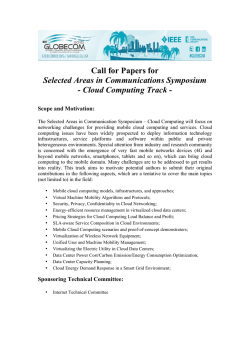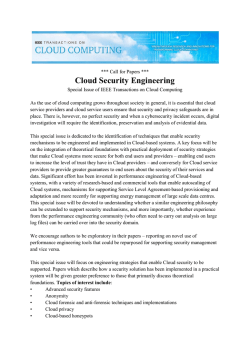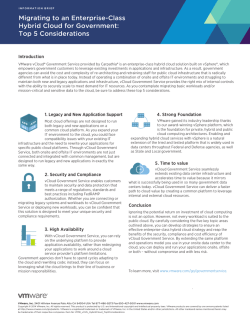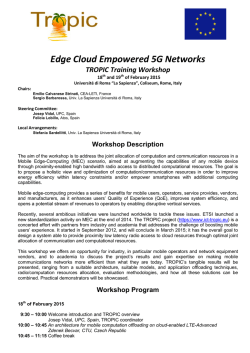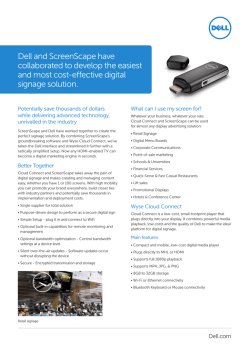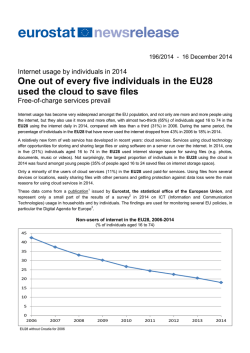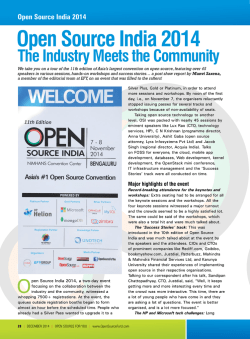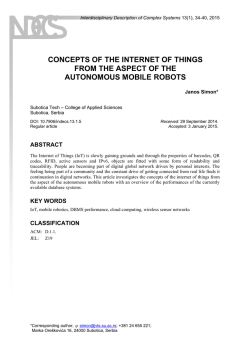
EPAM Private Cloud Service Offering - EPAM Cloud
Title: EPAM Private Cloud Service Offering Confidential Saved: 29-Jan-2015 20:58 PID: EPAM Private Cloud Service Offering REVISION HISTORY Approved Rev. Description of Change Author Date 0.1 Draft version Dzmitry Pliushch August, 2014 Eli Feldman, Ivan Tabaravets, Sasha Kazlouski, Siarhei Sinkevich 1.0 Initial publication Dzmitry Pliushch September, 2014 1.1 Billing Policy Update Dzmitry Pliushch November, 2014 Eli Feldman, Ivan Tabaravets, Sasha Kazlouski, Siarhei Sinkevich Eli Feldman, Ivan Tabaravets, Siarhei Sinkevich Name Effective Date 10.30.2014 11.10.2014 11.17.2014 RELATED ARTIFACTS Ref. Related Documents Legal Notice This document contains privileged and/or confidential information and may not be disclosed, distributed or reproduced without the prior written permission of EPAM Systems. Page: 1/8 © EPAM Systems, 2015 Title: EPAM Private Cloud Service Offering Confidential Saved: 29-Jan-2015 20:58 PID: 1 Introduction 1.1 The scope of the document The document covers the main terms and definitions of EPAM Private Cloud Service, the parties obligations, responsibilities and rights as well as the main principles of the Service provisioning and support. 1.2 Purpose of the document The purpose of this document is to define the scope of services provided by EPC, the scope of responsibilities of EPC team in terms of these services provisioning, and all the related limitations. The document is available online on this page: https://cloud.epam.com/site/about/terms_and_agreements/EPC_Policy.pdf 2 Terms and Definitions 2.1 Parties 2.2 2.3 Service Provider: EPAM Private Cloud team Service Recipient: EPAM Customer who approved the usage of EPAM Private Cloud by a team of EPAM employees working on the Customer’s project; EPAM internal projects who use EPC for project needs (by approval of the project managers). Service Users: a team of EPAM employees working on a project or projects activated in Cloud EPAM Private Cloud Definition EPAM Private Cloud (EPC) is a self-service that provides the users with the ability to create and manage their own virtual infrastructure, as well as to provide the users with a set of related services. The virtual infrastructure can consist of one or several virtual servers (VMs) configured according to user’s needs (in scope of the possibilities provided by EPC), and can include additional storage volumes and checkpoints. The list of the services provided by EPC is given on https://cloud.epam.com/site/competency_center/e=p=c_services page Acronyms and Abbreviations Abbreviation EPC VM CLI ESP AWS UPSA Legal Notice Full Term EPAM Private Cloud Virtual Machine (Virtual Server) Command Line Interface EPAM Support Portal Amazon Web Services EPAM Utilization and Project Staffing Analyzer This document contains privileged and/or confidential information and may not be disclosed, distributed or reproduced without the prior written permission of EPAM Systems. Page: 2/8 © EPAM Systems, 2015 Title: EPAM Private Cloud Service Offering Confidential Saved: 29-Jan-2015 20:58 PID: 3 Terms and conditions 3.1 Offer acceptance Service offering is considered accepted when a Project Manager or Coordinator submits a request for activating a project in Cloud. Since then, the EPAM Customer who approved using Cloud for their project is considered service recipient and all the members of the activated project are considered Service Users and should keep to the rules and recommendations listed in this document. 3.2 Service Provider obligations, responsibilities and rights EPAM Private Cloud team acts as Service provider and is responsible for the following: Delivering EPAM Private Cloud Computing service and the other services related to it (The list of the services provided by EPC is given on https://cloud.epam.com/site/competency_center/e=p=c_services page ) Notifying Service Recipient about all planned and unplanned service interruptions Providing Service Recipient with complete and comprehensive information about service delivery status Notify Service Customer about changes and amendments to terms and conditions of service Service Provider has right to: 3.3 Change the Service performance and components Stop providing the Service to the Recipients who fail to timely pay for the Service usage, with the following Service resumption after all the Recipient’s debts are sunk. Service Recipient obligations, responsibilities and rights Service Recipient is responsible for: Providing the project teams with clear instructions on the extent to which they can use the service, this can include the monthly sum the Recipient agrees to cover for the Service usage. Timely payment for the Service Usage Service Recipient has right to: 3.4 3.5 Request the information on the Service Usage cost, the cost details and the resources created by Service Users in scope of the Service Recipient’s project needs and get the full details according to the request Service User obligations, responsibilities and rights Service User is obliged to: Keep to the Service terms and conditions rules and recommendations covered in this and other Service-related documents By request, provide the project management with the information on the resources the User utilizes in Cloud PM/PC is responsible for removing the project infrastructure from the Cloud before the project closure. Revision of service offering Current service offering is reviewed on annual basis by Service Manager and approved by Director of the IT department. Legal Notice This document contains privileged and/or confidential information and may not be disclosed, distributed or reproduced without the prior written permission of EPAM Systems. Page: 3/8 © EPAM Systems, 2015 Title: EPAM Private Cloud Service Offering Confidential Saved: 29-Jan-2015 20:58 PID: 3.6 Billing and Costs EPC is a paid service except for the servers run under Personal Projects. The bills are issued monthly basing on EPC Billing strategy published on http://cloud.epam.com pages. EPC bills can include costs for AWS utilization in case the service was used via Maestro CLI tools. The details on the Amazon billing are available by the following link: http://aws.amazon.com/ec2/pricing/ EPC team is not responsible for any changes in performance and billing strategy of the third-party services/applications integrated with Cloud. The user can estimate the cost of a planned or existing infrastructure using the Cost Estimator tool accessible at http://cloud.epam.com. This tool provides approximate costs for the described infrastructure. The estimated sum can differ from the real billing data due to infrastructure changes and differences in load. Every Project has its own quota for cloud resource utilization. Account Manager defines the actual quota value in UPSA, for each project separately, on its activation. A project in ON HOLD state is billed the same way as ACTIVE state projects are. Project Managers/Coordinators have possibility to watch over the project quotas. The month-end closure is performed on the 5th of the following month. At this day we send e-mail reports to EPAM Revenue Group. These reports contain the costs for the previous month for all the projects activated in EPAM Private Cloud. It includes both EPAM Private Cloud and AWS costs. When a Project is closed in UPSA, all the remaining resources of this project are still billed for the following 7 days, and after that, they are automatically removed. For more details on quota utilization, see Quotas Guide published at http://cloud.epam.com. 4 EPAM Private Cloud Service 4.1 EPC Main Points EPC is a self-service. EPC Support Teams do not take part in creating and setting servers for Cloud users (except for the cases when the users cannot perform the needed operations by themselves due to Service specifics or issues). EPC provides the users, registered in system, with the possibility to create and manipulate virtual resources by means of the tools supported by EPC. The following EPC tools are available: Maestro CLI (download at https://cloud.epam.com): A Command line interface that allows user to manipulate the infrastructure and retrieve the information on it. Web-interface (available at https://cloud.epam.com): designed to provide the user with the ability to monitor their Cloud infrastructure components, their performance and billing details. Here, the user can also find a Cost Estimator tool used for estimation of the costs for the resources planned to create, and the links to EPC knowledge base. Projects teams should take care about data and VM’s safekeeping. There is no VMs backup as default service in EPC. It is Project/Account Manager responsibility to define a backup strategy for environment (IT Services do not provide environments backups by default). Projects activation/deactivation, adding new shapes for projects, user permissions setup (except of the default Cloud Legal Notice This document contains privileged and/or confidential information and may not be disclosed, distributed or reproduced without the prior written permission of EPAM Systems. Page: 4/8 © EPAM Systems, 2015 Title: EPAM Private Cloud Service Offering Confidential Saved: 29-Jan-2015 20:58 PID: Project roles), migrating instances to another project in EPC can be performed only after PM/PC approval and only by Cloud Support specialists. 4.2 4.3 The recommended alternate work/backup strategies for EPAM Private Cloud usage are: Environment automatic restoring by prepared and tested scripts (auto-configuration feature) in another EPAM Cloud availability zone; External Cloud providers (AWS, Azure, etc.) usage; VM backups/replication; Using another available EPAM Cloud zone; Using infrastructure provided by Customer. An employee can submit a VM-related support and maintenance request only in case they are a member of the project to which this VM is assigned. EPC project resources (VMs, storages etc.) should be used for project needs by employees assigned to the project to which these resources belong. EPC can provide access to AWS via a set of Maestro CLI tools. The full list of the available facilities is described in AWS Utilization Guide (https://cloud.epam.com/site/develop/hybrid_cloud/ciug_10_AWS_utilization.pdf) The users are responsible for the licensing of the third-party software installed to VMs in Cloud. All the unlicensed software that runs counter to EPAM policy should be licensed properly or removed by the owners of the VMs. Projects activation/deactivation, adding new shapes for projects, user permissions setup (except of the default Cloud Project roles), migrating instances to another project in EPC can be performed only after PM/PC approval and only by Cloud Support specialists. The project is deactivated in Cloud after it is marked as closed in UPSA. After project deactivation in Cloud, all instances assigned to this project will be stopped immediately and deleted in 7 days. When a projects state is changed to “CLOSED”, the management of this project gets a notification on the servers existing on it. EPC Infrastructure Specifics EPC provides infrastructure within the limits of EPAM Systems hardware capacities. The performance of virtual servers depends on EPAM Private Cloud infrastructure load and may vary. EPC, as other Cloud Service Providers, provides VMs with virtual CPUs (vCPU) that differ from hardware CPUs. The CPUs performance and capacity depend on the load of the EPAM Private Cloud server where the VM is located and cannot be influenced manually. All VMs ordered by EPAM Cloud user must comply with a standard SHAPES available in EPC. List of it is available at https://kb.epam.com EPAM Cloud FAQ pages. Personal Virtual Servers Each EPAM Employee has possibility to order Personal VM. Depending on job title, users have personal quotas (details at https://kb.epam.com EPAM Cloud FAQ Documentation pages). Virtual servers created under the PERSONAL Project should be used for personal purposes only (training, investigation, estimations, etc.), not for project activities. A personal project is deactivated and all the related resources are deleted if the project owner status changes from ‘active’ to ‘inactive’, ‘maternity leave, ‘extended leave’. Legal Notice This document contains privileged and/or confidential information and may not be disclosed, distributed or reproduced without the prior written permission of EPAM Systems. Page: 5/8 © EPAM Systems, 2015 Title: EPAM Private Cloud Service Offering Confidential Saved: 29-Jan-2015 20:58 PID: 5 EPC Support and Customer Care 5.1 Main Principles 5.2 EPC is a self-service that is accurately documented. In case an issue or question arise, it is recommended to learn https://kb.epam.com EPAM Cloud FAQ section and the Documentation related to your issue area. This way often takes less time than submitting and processing a support request. In case the issue is not covered in the mentioned resources or any additional assistance is needed, it is recommended to submit a Support Request at EPAM Service Portal at http://support.epam.com EPAM Private Cloud. For Cloud Support and Consulting teams, these requests have higher priority than any. EPC Support Teams and Their Responsibilities Cloud Support includes the following teams: Level 1 Support Team: registering and sorting the requests, informing the assignees on the high priority requests, answering the most common questions, providing the basic information on services, tracking the requests at every stage of their life-cycle, and other. Level 1.5 Support Team: Cloud infrastructure monitoring, escalation of complex issues to L2 Support Team, 24/7/365 availability, monitoring Cloud configuration and templates development, and other. Level 2 Support Team: resolving issues that cannot be handled by L1 and L1.5 support teams, passing the issues that cannot be solved to Level 3 Support or directly to ISV Support Level 3 Support Team: fixing issues in the following areas: UI usability, PMC integration, ESP Integration, report and billing, product issues, templates libraries. Cloud Consulting Team: initial project onboarding; existing project migration; migration process help; providing answers for general and specific Cloud Computing questions; client communication on architecture; delivery of training materials; EPC knowledge base development; acknowledging user feedback; reacting on and monitoring of initial user requests via email The provided responsibilities list gives the main responsibilities of EPC Support teams. The detailed list is available at https://kb.epam.com/display/EPMCIT/Cloud+Support+Teams. 5.3 The bug reporting procedure is a regulated procedure. The workflow is described in details on the following page: https://kb.epam.com/pages/viewpage.action?title=Consulting+Communication+Process&spaceKey=EPMCIT Support Requests The advised way for Service Users to submit a Support Request is using EPAM Service Portal (http://support.epam.com, section EPAM Private Cloud). The detailed instructions on submitting a support request are given on the following page: https://cloud.epam.com/site/competency_center/e=p=c_services/cloud_support_service_(=c=s=s) In situations when the immediate assistance is needed, Cloud Users can address directly to Cloud Support Groups (the contacts are given in Section 5.4) 5.3.1 Request for Service An interaction that contains a formal request for information, advice, standard change or access to service is a Request Legal Notice This document contains privileged and/or confidential information and may not be disclosed, distributed or reproduced without the prior written permission of EPAM Systems. Page: 6/8 © EPAM Systems, 2015 Title: EPAM Private Cloud Service Offering Confidential Saved: 29-Jan-2015 20:58 PID: for Service. 5.3.2 Request for Change An interaction that contains a formal proposal of a non-standard change to asset, process or service is a Request for Change. 5.3.3 Request for Recovery An interaction that contains a formal complain of an incident, issue or problem is a Request for Recovery. 5.4 Points of Contact Cloud Consulting: [email protected] Cloud Support Level 1.5: [email protected] Cloud Support Level 2: [email protected] Cloud Support Level 3: [email protected] Help Desk: [email protected] 6 Subject of service 6.1 Service overview EPAM Private Cloud is a service that provides its users with Cloud Computing facilities. EPC provides the users, registered in system, with the possibility to create and manipulate virtual resources by means of the tools supported by EPC. 6.2 Service Level Agreement 6.2.1 Service Availability Service Availability frame: 24/7, Service Operation frame (Cloud Support Level 1.5): 24\7 Cloud Support Level 1 (HelpDesk): 24/7 Cloud Support Level 2: Mon-Fri, 9:00-18:00 Minsk time Cloud Support Level 3: Mon-Fri, 9:00-18:00 Kiev time Cloud Consulting: - Mon-Fri, 9:00-18:00 Minsk time Exceptional one-time unavailability: no longer than 1 hour Planned one-time unavailability: no longer than 3 hours 6.2.2 Service Categories Categories EPAM Private Cloud – Other EPAM Private Cloud : Consulting Legal Notice Responsibilities Task performance time EPAM Cloud - Cloud Support Level 1.5 This document contains privileged and/or confidential information and may not be disclosed, distributed or reproduced without the prior written permission of EPAM Systems. Page: 7/8 © EPAM Systems, 2015 Title: EPAM Private Cloud Service Offering Confidential Saved: 29-Jan-2015 20:58 PID: Auto-configuration: consulting Common Questions Training/Webinar request EPAM Private Cloud : Incidents Cloud Function(s) Issue Documentation Issue EPAM Orchestrator Portal Issue Incorrect state of Virtual Machine Maestro CLI Issue Not Enough Permission Virtual Machine is Unavailable EPAM Private Cloud : Project Management Activate Project or Region in EPAM Private Cloud Add Available Shapes for Project Setup users permission EPAM Private Cloud : Virtual Machine Configuration Increase System Disk Space Change Virtual Machine Owner Export Custom Image Import Custom Image Access for customers : Expose server to Internet Migrate Virtual Machine to Another Project Order Virtual Server Set Static IP for Cloud Virtual Machine Supply non-typical software to Virtual Server EPAM Private Cloud - Consulting EPAM Private Cloud - Consulting EPAM Private Cloud - Consulting 1d 0h 1d 0h 1d 0h 6h 3h 3h 1h 6h 1h 2h EPAM Cloud - Cloud Support Level 1.5 6h EPAM Cloud - Cloud Support Level 1.5 6h EPAM Cloud - Cloud Support Level 1.5 6h EPAM Cloud - Cloud Support Level 1.5 3d 0h EPAM Cloud - Cloud Support Level 1.5 6h EPAM Cloud - Cloud Support Level 1.5 7d 0h Service Desk 7d 0h Service Desk 9d 0h EPAM Cloud - Cloud Support Level 1.5 3h EPAM Cloud - Cloud Support Level 1.5 EPAM - Network 4h EPAM Cloud - Cloud Support Level 1.5 6.3 Service Interruption and Recovery 6.3.1 Planned service interruptions The Service is updated on a regular basis, typically once in 5-7 weeks. During the update, the resources hosted in EPAM Private Cloud remain available, but the CLI facilities are not accessible. Before the update, the Cloud Users get the e-mail notification with the details on the service unavailability time. After the update, the users get the notification on the Orchestration update. 6.3.2 Service interrupt notifications If an unexpected Service interruption or other issues that affect Service performance happen, EPAM Private Cloud team notifies the Cloud users on the problem with a respective SIN message. The other message is sent when the issue is fixed. End of document. Legal Notice This document contains privileged and/or confidential information and may not be disclosed, distributed or reproduced without the prior written permission of EPAM Systems. Page: 8/8 © EPAM Systems, 2015
© Copyright 2026
